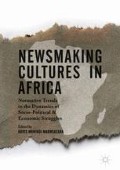Abstract
Contemporary Ethiopia has been characterized by political polarization and a resultant weak differentiation of the journalistic field from other social fields. The chapter examines how, in such an environment, Fana Broadcasting Corporate—a commercial broadcasting organization affiliated with the governing elite—has managed to carve out a unique position where it practices the kind of journalism that ensures the reproduction of the privileged worldview of the governing elite and at the same time garners a favorable reception from the audience. Using qualitative data and Bourdieu’s field theory, the chapter argues that the unequal distribution of different forms of capital resulting from Fana’s privileged association within the political and economic fields has contributed to the creation of status hierarchies within the media field, situating this particular media house at the top of such hierarchy.
Access this chapter
Tax calculation will be finalised at checkout
Purchases are for personal use only
References
Binyam, Tamene. 2013. The Impact of Ethiopia’s Anti-terrorism Proclamation on Freedom of the Press: The Case of the Ethiopian Private Press. Master’s Thesis, Addis Ababa University.
Bourdieu, Pierre. 1990. The Logic of Practice. Stanford, CA: Stanford University Press.
———. 1992. An Invitation to Reflexive Sociology. Chicago: University of Chicago Press.
———. 1994. In Other Words: Essays Towards a Reflexive Sociology. Cambridge: Polity Press.
———. 1996. The Rules of Art. Cambridge: Polity Press.
———. 1997. Pascalian Meditations. London: Polity Press.
———. 1998a. On Television and Journalism. London: Pluto Press.
———. 1998b. Practical Reason. Cambridge: Polity Press.
———. 2002. Habitus. In Habitus: A Sense of Place, ed. Jean Hillier and Emma Rooksby, 27–36. Aldershot: Ashgate.
Bourdieu, Pierre, and Loic Wacquant. 1992. An Invitation to Reflexive Sociology. Cambridge: Polity Press.
Emirbayer, Mustafa, and Victoria Johnson. 2008. Bourdieu and Organizational Analysis. Theory and Society 37 (1): 1–44.
Ethiopian Government Communication Affairs Office (GCAO). 2012. Developmental Media, Communications and Ethiopian Renaissance. Addis Ababa: Ethiopian Government Communication Affairs Office (GCAO).
FBC Annual Publication. 2014. Fana Broadcasting Corporate Program Manual and Editorial Policy. Addis Ababa: FBC Annual Publication.
Hailegebriel, Endeshaw. 2005. Ethical Issues in News Reporting with Particular Reference to the Ethiopian Herald Newspaper. Masters Thesis, Addis Ababa University.
Hallin, Daniel, and Paolo Mancini. 2004. Comparing Media Systems: Three Models of Media and Politics. New York: Cambridge University Press.
Hovden, Jan. 2012. A Journalistic Cosmology: A Sketch of Some Social and Mental Structures of the Norwegian Journalistic Field. Nordicom Review 33 (2): 57–76.
Jansson, Andre. 2015. Using Bourdieu in Critical Mediatization Research: Communicational Doxa and Osmotic Pressures in the Field of UN Organizations. MedieKultur 31 (58): 13–29.
Johnson, Chalmers. 1987. Political Institutions and Economic Performance. In The Political Economy of the New Asian Industrialism, ed. C.F. Deyo. Ithaca, NY: Cornell University.
McChesney, Robert. 2003. The Problem of Journalism: A Political Economy Contribution to an Explanation of the Crisis in Contemporary U.S. Journalism. Journalism Studies 4 (3): 299–329.
Meyen, Michael, and Anke Fiedler. 2013. Journalists in the German Democratic Republic: A Collective Biography. Journalism Studies 14 (3): 321–335.
Mkandawire, Thandika. 2001. Thinking About Developmental States in Africa. Cambridge Journal of Economics 25 (3): 289–231.
Neveu, Erik. 2007. Pierre Bourdieu: Sociologist of Media, or Sociologist for Media Scholars? Journalism Studies 8 (2): 335–347.
Shimelis, Bonsa. 2002. The State of the Private Press in Ethiopia. In Ethiopia. The Challenge of Democracy from Below, ed. Bahru Zewde and Siegfried Pausewang, 184–201. Nordiska Afrikainstitutet: Uppsala.
Shultz, Ida. 2007. Context in Newsroom Ethnography: Reflexive Sociology and the Concepts of Journalistic Field, News Habitus and Newsroom Capital. Paper presented at International Communication Association, San Francisco, May 24–28.
Skjerdal, Terje. 2012. Competing Loyalties: Journalism Culture in the Ethiopian State Media. PhD diss., University of Oslo.
Stremlau, Nicole. 2012. The Press and the Political Restructuring of Ethiopia. Journal of East African Studies 5 (4): 716–732.
———. 2014. Media, Participation and Constitution-Making in Ethiopia. Journal of African Law 58 (2): 231–249.
Styan, David. 1999. Misrepresenting Ethiopia and the Horn of Africa? Constraints and Dilemmas of Current Reporting. In The Media of Conflict: War Reporting and Representations of Ethnic Violence, ed. Tim Allen and Jean Seaton, 287–304. New York: Zed Books.
Sukosd, Miklos, and Lake Wang. 2013. From Centralization to Selective Diversification: A Historical Analysis of Media Structure and Agency in China, 1949–2013. Journal of Media Business Studies 10 (4): 83–104.
Ward, David. 2011. Ethiopia Media Mapping 2011. Electoral Reform International Services (ERIS).
Ward, David, and Selam Ayalew. 2011. Audience Survey: Ethiopia 2011. Electoral Reform International Services (ERIS). http://docslide.us/documents/audience-survey-55845fcd13da0.html. Accessed 18 Feb 2016.
Webb, Jen, Tony Schirato, and Geoff Danaher. 2002. Understanding Bourdieu. Crows Nest, NSW: Allen & Unwin.
White, Gordon. 2006. Towards a Democratic Developmental State. IDS Bulletin 37 (4): 60–70.
Willig, Ida. 2012. Newsroom Ethnography in a Field Perspective. Denmark: Sage.
Willig, Ida, Waltorp Karen, and Jannie Hartley. 2015. Field Theory Approaches to New Media Practices: An Introduction and Some Theoretical Considerations. MedieKultur 31 (58): 1–12.
Author information
Authors and Affiliations
Editor information
Editors and Affiliations
Copyright information
© 2018 The Author(s)
About this chapter
Cite this chapter
Zerai, A., Alemu, F. (2018). The Journalistic Field in Ethiopia: Where Partisanship and Credibility Cohabit. In: Mabweazara, H. (eds) Newsmaking Cultures in Africa. Palgrave Macmillan, London. https://doi.org/10.1057/978-1-137-54109-3_14
Download citation
DOI: https://doi.org/10.1057/978-1-137-54109-3_14
Published:
Publisher Name: Palgrave Macmillan, London
Print ISBN: 978-1-137-54108-6
Online ISBN: 978-1-137-54109-3
eBook Packages: Literature, Cultural and Media StudiesLiterature, Cultural and Media Studies (R0)

